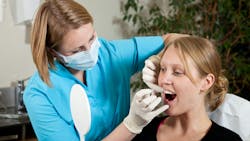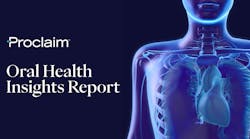How do patients feel about extra screenings? New data might surprise you
The link between periodontal disease and cardiovascular problems
Some patients don't want to be bothered with health care screenings when they're at the dentist, but new data says that's far from the norm.
These kinds of screenings are sorely needed to improve health outcomes in the United States. Oral health and heart health may seem unrelated, but recent data from CareQuest reveals those with periodontal diseases are more likely to suffer cardiovascular complications. In fact, the risk of experiencing a heart attack or stroke is two to three times higher.1
Children are not exempt from this risk, either. One in six children with a heart condition show signs of poor oral health, which may be exacerbated by poverty, disabilities, or other factors that can impede regular dental visits.1 Unhealthy gums can also increase a child's risk for developing infective endocarditis, particularly in those with existing heart problems. Common pediatric oral health problems such as baby bottle tooth decay, thumb sucking, tongue thrusting, and early tooth loss make it even more imperative to stress the importance of routine dental care.2
With heart disease still the leading cause of death in the US, effective communication between dentists and medical providers is critical. By offering health screenings during regular visits, clinicians can help detect and curb the risk of heart disease and other conditions in patients of all ages.
An apple a day...
According to CareQuest's State of Oral Health Equity in America survey, in a dental setting:
-
70% of patients are comfortable with blood pressure screenings
-
54% are comfortable with diabetes screenings
-
45% are comfortable with HIV screenings
-
79% are comfortable with oral cancer screenings
However, most adults haven't had any of these screenings during their visit.3
In fact, only 4% say they have been referred to a primary care provider by their dentists and 7% received a referral to another health care professional. But perhaps the biggest disparity of all is that 93% of respondents believe oral health is as important to the overall health of a person as their physical health.3 So why is the health care gap so large?
Closing the gap
Ensuring patients receive the comprehensive care they need depends on communication and collaboration between providers. Returning to the link between gum disease and cardiovascular problems, those with preexisting health conditions-or people with limited access to traditional health care-would benefit greatly from easier access to screenings.
There are a few ways to help close this gap. To enhance patient care and potentially reduce costs, clinicians can try co-locating dental and medical services in the same building, utilizing and integrating electronic health records (EHRs), and promoting referrals between dental and medical providers.
Emphasizing the importance of routine screenings in dental offices may prevent or alleviate future complications of all kinds; conditions like diabetes, hypertension, and HIV can be addressed and treated if they're caught early on. Thus, going to your routine dental visit may help save your life.
Resources
-
Links between cardiovascular health and oral health. CareQuest. June 6, 2024. https://www.carequest.org/resource-library/heart-matter
-
Oral health problems in children. WebMD. March 7, 2024. https://www.webmd.com/oral-health/oral-health-problems-children
-
Experiences with and outcomes of oral health care. March 15, 2024. https://www.carequest.org/resource-library/experiences-and-outcomes-oral-health-care
About the Author

Sarah Butkovic, MA, BA
Sarah Butkovic, MA, BA, is an Associate Editor at Endeavor Business Media, where she works on creating and editing engaging and informative content for today's leading online dentistry publications. She holds a Master's English Language and Literature from Loyola University Chicago and is passionate about producing high-quality content that educates, inspires, and connects with readers.

